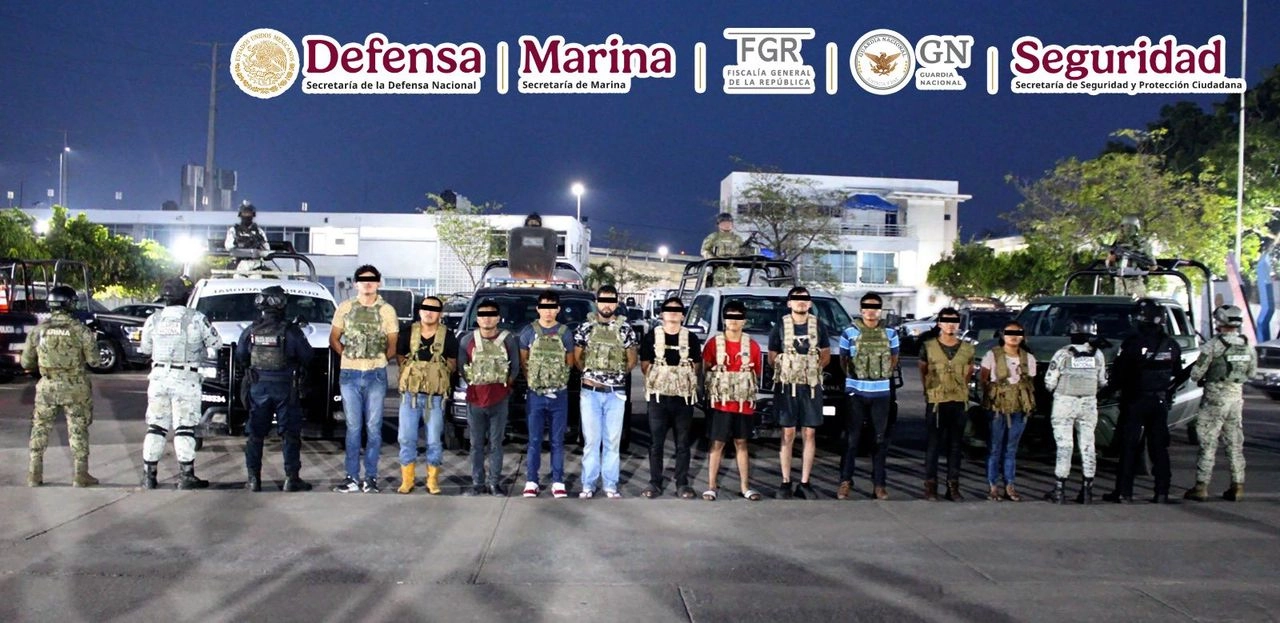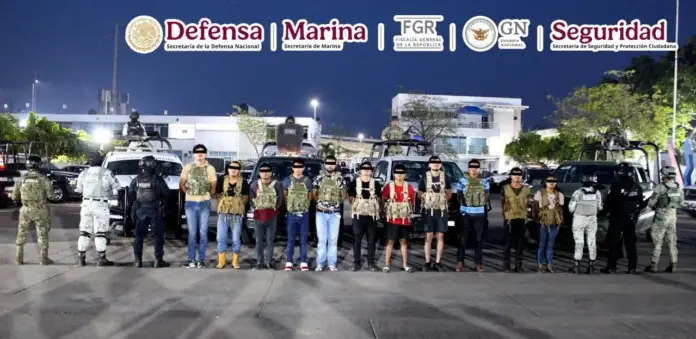Among the 17 hitmen arrested in the municipality of Los Reyes, Michoacán, following the deaths of eight soldiers as a result of a landmine explosion, ten were identified as former Colombian soldiers, federal authorities reported, announcing the results of the actions taken against criminal groups in the country.
The arrest exposes the growing involvement of former foreign soldiers, particularly from Colombia, in Mexican cartels.
“In Los Reyes, members of the Mexican Army arrested 17 people, 12 of them foreign nationals, 10 of whom are former soldiers. They seized seven replicas of long weapons, magazines, cartridges, 41 explosive devices, a box of explosives, a bucket of black powder, 13 ballistic plates, two ballistic helmets, a tactical vest, and four vehicles.”
This is not the first time that former Colombian military personnel have been detained by Mexican authorities during operations against members of criminal organizations. It should be noted that on May 15, a clash between members of the armed forces and members of the Jalisco New Generation Cartel (CJNG) left 12 attackers dead and three members of the Mexican Navy (Semar) were injured.
During that operation, nine members of a criminal cell were arrested. In this regard, the Secretary of Security and Citizen Protection (SSPC), Omar García Harfuch, reported through his “X” account (formerly Twitter) that “in Huitzontla, Michoacán, in an operation led by the Navy @SEMAR_mx in coordination with the Security Cabinet, @Defensamx1, @FGRMexico, @GN_MEXICO_, @SSPCMexico, and with the support of the Government of Michoacán through @SSeguridad_Mich, @FiscaliaMich, nine members of a criminal cell were arrested, linked to the crimes of homicide, extortion, and illegal deprivation of liberty.”
On this occasion, those arrested last night are allegedly members of the Los Reyes Cartel, according to information from sources at the 21st Military Zone, based in Morelia.
Among the 17 detainees, 12 are Colombian nationals, ten of whom are former Colombian military personnel with knowledge in the manufacture and handling of explosives.
The detainees were handed over to the Attorney General’s Office (FGR) and are being investigated as alleged perpetrators of the manufacture and explosion of the “narco-mine” that caused the deaths of the soldiers patrolling a rural road in the town of El Santuario, Los Reyes municipality, in a SandCat armored tactical vehicle. This is where an organized crime operation center had been identified.
- Colombian “mercenaries” –
The presence of Colombians in Mexican cartels has increased in recent years, according to authorities and specialists.
The disarmament of the FARC guerrilla group in 2017 and the reduction in Colombia’s military budget have prompted the arrival of Colombian citizens, security consultant David Saucedo told AFP.
Some come directly from Colombia, “and others were mercenaries in Ukraine (…), they were part of the foreign legion” fighting in the war against Russia, Saucedo added.
For years, it has been documented that Colombian mercenaries, mostly retired military personnel, have fought in conflicts such as those in Afghanistan, Yemen, and Iraq.
In 2023, Colombian gunmen killed Ecuadorian presidential candidate Fernando Villavicencio, while in 2021, Colombian hitmen assassinated Haitian President Jovenel Moïse.
- A result of militarization –
Cartels are seeking former Colombian military personnel and guerrillas for their knowledge of the use of explosives, Saucedo stated.
In October 2023, the Michoacán Public Security Secretariat reported the dismantling of a “Colombian cell” dedicated to the “manufacturing of explosives with drones.”
The involvement of former Mexican and foreign military personnel is nothing new in Mexico, whose bosses have maintained dealings with numerous mafias since the days of the late Medellín cartel leader, Pablo Escobar.
Former members of an elite force of the Mexican Army founded the bloodthirsty Zetas cartel in the late 1990s and recruited deserters from the Guatemalan military, the Kaibiles.
The mobilization of former foreign soldiers “is a reaction to the militarization process” that Mexico has been experiencing since 2006, when the government launched a controversial military operation against drug trafficking gangs, according to Saucedo.
The spiral of violence unleashed since then has led Mexico to triple its homicide rate to 24 per 100,000 inhabitants, with some 30,000 cases per year and a cumulative total of more than 120,000 missing persons.

Source: jornada




